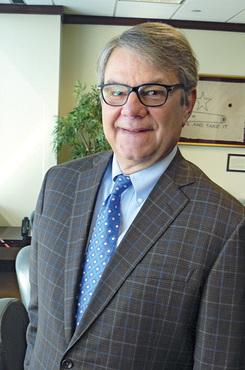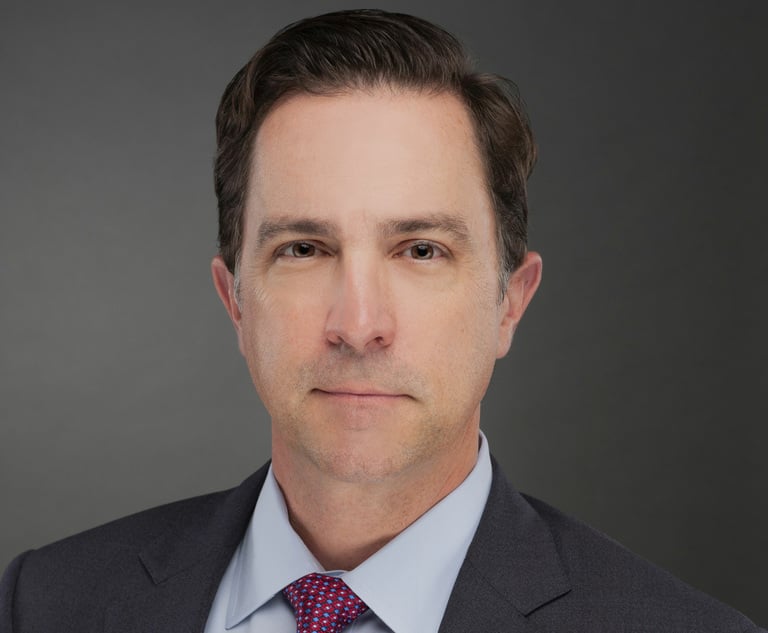22 States Have Lawyer Civility Oaths. It's not enough.
A promise to be civil in the new-lawyer oath may be a good starting point, but stakeholders and observers recognize the oath is not enough to stem the ongoing problem of lawyers behaving badly.
November 14, 2019 at 03:00 PM
6 minute read
 A man holds up his right hand to swear an oath. Photo: Diego M. Radzinschi/ALM
A man holds up his right hand to swear an oath. Photo: Diego M. Radzinschi/ALM
Recognizing a rise is attorney misbehavior, nearly half the states in America have added a promise to remain civil to the oaths that lawyers take to gain admission to the bar.
It's a good starting point and worthy goal, but stakeholders and observers say the oath is not enough to stem the ongoing problem of lawyers behaving badly.
"You can be more effective by treating your opposing counsel and opposing parties with respect and dignity," said Mike Maguire, national president of the American Board of Trial Advocates, the group that spread the civility oath around the nation. "I think it's had an effect at teaching lawyers, early on, that you can be effective by treating people well. You can be a zealous advocate, without becoming a zealot."
Still, enforcing civility is easier when attorneys know they'll face ethics charges, or a judge's wrath, when they misbehave, Maguire said.
"The key thing is that the profession needs to enforce rules that sanction and prohibit uncivil, unprofessional behavior," he said.
That sentiment is echoed by New York University School of Law Professor Stephen Gillers, who calls for more teeth than one oath can provide to enforce decency among attorneys.
"I admire the impulse; I admire the goal. But I think the impact on actual behavior will be negligible. It's sad to say, but if anything, we've seen increasing levels of incivility over the years, not decreases," Gillers said. "Unless there is a price—unless a lawyer, inclined to behave badly, can anticipate a sanction that will hurt—he or she will do it."
Civility oath spreads
The push to add a promise to remain civil to the new-lawyer oath was led by the American Board of Trial Advocates, a legal advocacy group with invitation-only membership for highly experienced litigators. Twenty-two states, including California, Texas, Florida, Virginia and Delaware, have adopted lawyer civility oaths. Many other states—like Connecticut, New Jersey, New York and Pennsylvania—that haven't adopted such oaths still offer attorneys training about civility through their local ABOTA chapters.
 On this map, the blue-colored states have civility language in their attorney oaths. Photo: American Board of Trial Advocates
On this map, the blue-colored states have civility language in their attorney oaths. Photo: American Board of Trial AdvocatesDavid Chamberlain, former president of the Texas Chapters of ABOTA who advocated for the Texas civility oath in 2015, said it's hard to measure the impact of the oath in the four years since it passed the Texas Legislature. That law added a line to the oath to "conduct oneself with integrity and civility in dealing and communicating with the court and all parties."
"I think it's just a part of something that sets the right tone at the very beginning of a lawyer's career," Chamberlain said. "It gives the lawyer something to talk to the client about: 'I can't or shouldn't do certain things. Not only here is the Texas lawyers creed, which guides my conduct, but I also took a civility oath when I got my license, so I am under oath to conduct myself civilly.'"
The oath is not a basis for an attorney disciplinary rules violation, nor can clients sue their attorneys for legal malpractice based on alleged violations of the oath, he noted. Stakeholders of plaintiffs and defense attorney associations, and lawmakers who champion tort reform efforts, needed those promises before they supported the bill in the legislature, explained Chamberlain.
 David Chamberlain, a senior partner in Chamberlain McHaney in Austin. Photo: Angela Morris/ALM
David Chamberlain, a senior partner in Chamberlain McHaney in Austin. Photo: Angela Morris/ALM"As far as anything else we could do in the legislature, I don't see that on the immediate horizon. I see it at this point more in terms of education, socialization and mentorship," he said.
ABOTA has also led an effort to train attorneys about civility. Its civility matters program elevates standards of integrity, honor and courtesy among lawyers, ABOTA spokeswoman Tara Nunley explained in an email.
"Our local chapters host programs around the country to teach and educate attorneys on civility in the courtroom," Nunley said about the program.
At the urging of the California Chapters of ABOTA and the State Bar of California, the California Supreme Court in 2014 adopted a change to the lawyer oath for attorneys to swear, "as an officer of the court, I will strive to conduct myself at all times with dignity, courtesy and integrity." Just like in Texas, the oath can't form a basis for grievances or professional negligence lawsuits.
Beyond the oath, California has launched voluntary civility and professionalism guidelines to provide a model for what attorneys, voluntary bar associations and courts should expect from lawyers' behavior. Those guidelines have been adopted by 17 local bar associations and courts, including bars in Los Angeles, San Diego and Sacramento, and U.S. District Courts in the Central, Northern and Southern Districts of California.
Adding teeth
 Stephen Gillers, a professor at New York University School of Law. Photo: Courtesy photo
Stephen Gillers, a professor at New York University School of Law. Photo: Courtesy photoFlorida has had its civility oath even longer—since 2011, when the Florida Chapters of ABOTA supported the change. Unlike in other states, Florida's oath is enforceable within the state's attorney discipline rules.
South Carolina, which has had a civility oath since 2003, also allows attorneys to face discipline for violating the oath.
That type of bite is what's really needed to change the profession, not only from the bar's disciplinary arm, but from judges too, said Gillers, the law professor from New York.
"If judges were more aggressive in their insistence on decency—I don't say politeness; I just say decency—in the ways lawyers treat others, I think we'd see a sharp decline in incivility," Gillers said. "Anything that increases the chances of a judicial sanction will work toward reducing incivility. When I say sanction, I don't mean a fine, or other effect on your license to practice. I mean simply an opinion in which you are called out."
This content has been archived. It is available through our partners, LexisNexis® and Bloomberg Law.
To view this content, please continue to their sites.
Not a Lexis Subscriber?
Subscribe Now
Not a Bloomberg Law Subscriber?
Subscribe Now
NOT FOR REPRINT
© 2025 ALM Global, LLC, All Rights Reserved. Request academic re-use from www.copyright.com. All other uses, submit a request to [email protected]. For more information visit Asset & Logo Licensing.
You Might Like
View All
O'Melveny, White & Case, Skadden Beef Up in Texas With Energy, Real Estate Lateral Partner Hires
5 minute read
Chamberlain Hrdlicka Taps a New Leader as Firm Follows Succession Planning Path
3 minute read
Law Firms Are 'Struggling' With Partner Pay Segmentation, as Top Rainmakers Bring In More Revenue
5 minute read
Trending Stories
Who Got The Work
J. Brugh Lower of Gibbons has entered an appearance for industrial equipment supplier Devco Corporation in a pending trademark infringement lawsuit. The suit, accusing the defendant of selling knock-off Graco products, was filed Dec. 18 in New Jersey District Court by Rivkin Radler on behalf of Graco Inc. and Graco Minnesota. The case, assigned to U.S. District Judge Zahid N. Quraishi, is 3:24-cv-11294, Graco Inc. et al v. Devco Corporation.
Who Got The Work
Rebecca Maller-Stein and Kent A. Yalowitz of Arnold & Porter Kaye Scholer have entered their appearances for Hanaco Venture Capital and its executives, Lior Prosor and David Frankel, in a pending securities lawsuit. The action, filed on Dec. 24 in New York Southern District Court by Zell, Aron & Co. on behalf of Goldeneye Advisors, accuses the defendants of negligently and fraudulently managing the plaintiff's $1 million investment. The case, assigned to U.S. District Judge Vernon S. Broderick, is 1:24-cv-09918, Goldeneye Advisors, LLC v. Hanaco Venture Capital, Ltd. et al.
Who Got The Work
Attorneys from A&O Shearman has stepped in as defense counsel for Toronto-Dominion Bank and other defendants in a pending securities class action. The suit, filed Dec. 11 in New York Southern District Court by Bleichmar Fonti & Auld, accuses the defendants of concealing the bank's 'pervasive' deficiencies in regards to its compliance with the Bank Secrecy Act and the quality of its anti-money laundering controls. The case, assigned to U.S. District Judge Arun Subramanian, is 1:24-cv-09445, Gonzalez v. The Toronto-Dominion Bank et al.
Who Got The Work
Crown Castle International, a Pennsylvania company providing shared communications infrastructure, has turned to Luke D. Wolf of Gordon Rees Scully Mansukhani to fend off a pending breach-of-contract lawsuit. The court action, filed Nov. 25 in Michigan Eastern District Court by Hooper Hathaway PC on behalf of The Town Residences LLC, accuses Crown Castle of failing to transfer approximately $30,000 in utility payments from T-Mobile in breach of a roof-top lease and assignment agreement. The case, assigned to U.S. District Judge Susan K. Declercq, is 2:24-cv-13131, The Town Residences LLC v. T-Mobile US, Inc. et al.
Who Got The Work
Wilfred P. Coronato and Daniel M. Schwartz of McCarter & English have stepped in as defense counsel to Electrolux Home Products Inc. in a pending product liability lawsuit. The court action, filed Nov. 26 in New York Eastern District Court by Poulos Lopiccolo PC and Nagel Rice LLP on behalf of David Stern, alleges that the defendant's refrigerators’ drawers and shelving repeatedly break and fall apart within months after purchase. The case, assigned to U.S. District Judge Joan M. Azrack, is 2:24-cv-08204, Stern v. Electrolux Home Products, Inc.
Featured Firms
Law Offices of Gary Martin Hays & Associates, P.C.
(470) 294-1674
Law Offices of Mark E. Salomone
(857) 444-6468
Smith & Hassler
(713) 739-1250






